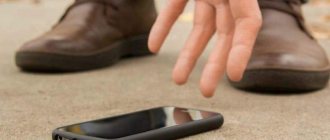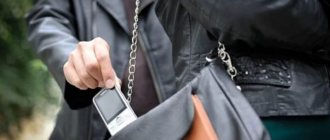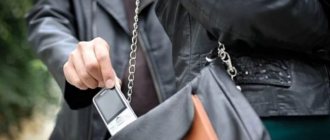Responsibility for theft is provided for in Art. 158 of the Criminal Code of the Russian Federation. The punishment under it is quite serious, therefore, if a person is unreasonably accused of theft, it is necessary to protect one’s rights. Let's figure out exactly how this is done.
In this article you will learn what to do if you are accused of theft and how to settle the case before trial.
Is finding a phone theft?
The line between theft and discovery is thin, often a person does not even notice how he crosses it. Many people are interested in what happens if they find a phone and don’t return it.
According to law enforcement statistics, a third of all property crimes committed are related to phone thefts.
If you contact the police about the theft or loss of a phone, the officers usually decide not to initiate criminal proceedings.
If you saw an ownerless item and picked it up, there is nothing illegal about it.
The situation is different with regard to computers and communications equipment, since these items are technically complex goods and are considered expensive.
If you did not return the phone to its owner and did not even try to do so, then you may be charged under Article 158 of the Criminal Code of the Russian Federation.
But can the discovery of a find really lead to criminal liability? To do this, you need to understand what is meant by theft and discovery.
The table will help us with this:
| Nakhodka | Theft | |
| Item | Property accidentally lost by the owner | Someone else's property that belongs to the owner |
| Subjective side | Coincidence | Intentionally committed unlawful act |
| Objective side | There is no material damage, since the phone was lost from the property. There is a disposal of property whose owner is unknown | Removal of the phone from the owner's property, causing material damage |
| Responsibility | No | Criminal |
That is, theft is a criminal act, and discovery is a category of civil law relations.
A person who finds a phone and decides to keep it is not in danger, provided that the owner of the device has not contacted the police to report it as missing or stolen.
The difficulty is that all phones have contacts with which you can return the communication device back to the owner.
If you do not do this intentionally with the goal of stealing the phone, then this may well serve as a reason for being charged with theft.
In addition, it should be borne in mind that in modern times it is easy to establish the location of a gadget.
This can be done by finding the signal using IMEI or using a special application.
○ I didn’t commit theft, how can I prove my innocence?
As we see, the responsibility for criminal acts is quite severe. But difficult situations often arise when an innocent person is accused. This may be due to the low quality of the preliminary investigation, when the authorized body does not take all measures to establish the truth in the case.
Then you will have to prove your innocence on your own or with the help of a lawyer.
If you are accused of a crime that you did not commit, you must:
- During interrogation, insist on your innocence, inform the investigator or interrogator who can confirm the testimony.
- Find as many witnesses as possible who can indirectly confirm innocence. For example, if you were at work during the theft, then it is necessary to interrogate as many colleagues as possible who will confirm this fact.
- If there are video cameras at the workplace, in a shopping center or other premises where you were at the time the crime was committed, then you need to petition the investigator to seize the recordings from the CCTV cameras. The records must be included in the criminal case file.
- Submit a petition to the authorized body to produce “billing”. That is, you can use your mobile phone to determine your location during the theft. To do this, it is enough to provide the investigator with your subscriber number and IMEI of your mobile phone.
- If you are a car enthusiast and were driving at the time of the theft, then it would be a good idea to include recordings from CCTV cameras installed on the road into your case.
- Take a lie detector test. This can be done independently in a commercial organization, or undergo an examination based on the decision of the investigator.
- Attach to the materials of the criminal case positive characteristics from your place of work, study, neighbors, as well as information about your financial situation.
All requests for individual investigative actions must be submitted in writing, sent through the office or by mail. You can submit the application in person, but so that you have a second copy with a note of acceptance.
If your application is refused, you can appeal it to the head of the law enforcement agency, the prosecutor's office or in court.
✔ Found a phone on the street and was charged
If you find a mobile phone on the street and you are accused of stealing it, you need to prove your innocence. To do this, it is advisable to emphasize that the phone is a find. This is evidenced by:
- There is no real possibility of returning the phone to its rightful owner, for example, because the phone does not have any contacts or a SIM card.
- The finder does not know who the phone belongs to and cannot guess about it.
- The situation where the device was found does not indicate that the owner was away for a while and will return soon.
- There is no selfish goal of getting rich, since the phone was found by chance, unexpectedly for the finder.
During the interview or interrogation, report where, when and under what circumstances the phone was found. During your testimony, tell us that you did not plan to use it, stored it and wanted to return it to the owner or hand it over to the authorities.
You should not immediately agree with the accusation. Prove that the phone was actually found and not stolen, then the initiation of a criminal case will be denied. And the case initiated is subject to termination, since there are civil legal relations.
✔ The security guard at the store called me a thief, what should I do?
The guards are interested in catching the “thief.” For this they receive a certain remuneration from the employer. Therefore, anyone can be under suspicion. In this situation, it is important to know that:
- Security guards do not have the right to search a suspect without police officers.
- A security officer can detain a person until the police arrive. But the detention must be justified, for example, CCTV cameras recorded the theft, or there were witnesses to illegal actions.
Wait for authorities or call the police yourself to prove your innocence.
In the future, you have every right to go to court with a claim for compensation for moral damage. In this case, it is also possible to demand compensation for material damage, for example, if during the arrest, the guard tore your clothes or damaged your other property.
What the law says
By picking up an ownerless item on the street, a person is not committing anything illegal. However, a clear distinction must be made between discovery and theft. If you pick up someone else's phone and do not try to return it to the owner, the police may accuse you of theft and prosecute you under Article 158 of the Criminal Code of the Russian Federation.
According to the law, you can be charged with cell phone theft in the following situations:
- the person who lost the device filed a police report about the theft;
- the person took the phone while the owner was temporarily away and will return soon;
- the finder knows who the device belongs to.
If a person is prosecuted, it will be very difficult to prove his innocence. Almost every phone has a contact list that helps identify the owner. Therefore, it is very difficult for the person who appropriated the find to find an excuse.
Article of the Criminal Code of the Russian Federation
The Criminal Code of the Russian Federation classifies theft as a criminal offense. In other words, this is a crime of varying severity - it can be either a minor sin or a rather serious charge.
Categories of thefts are distinguished from the total mass of reports by how much, what and how were stolen. However, the basic definition remains general. The theft is carried out secretly and is the deliberate theft of the property of another citizen of the Russian Federation.
If a citizen discovers a theft in the process of committing it, its name changes to outright robbery.
The differentiation of thefts by severity is specified in Article 158 of the Criminal Code of the Russian Federation. Let's look at the components of this legislative document in more detail.
Part one gives a comprehensive description of what theft is - it lists all the common (or standard) cases when an illegal act actually constitutes it.
The second part examines the concept of collective theft (committed by a team of people), and also examines the actions of pickpockets and theft from warehouses or offices (non-residential premises).
The third part separates from general thefts those that:
- Resulted in a major loss of the victim's property;
- Are made from apartments or residential buildings;
- They are related to the theft of the natural resources of the planet or country.
The fourth part describes the deliberate commission of thefts by criminal groups (organized gangs), as well as theft on an especially large scale.
Also, the article describes the penalties that apply to persons who have committed one or more of the above crimes. In addition to the type of theft and items, the punishment will depend on the method of committing the crime, aggravating or mitigating circumstances, and the value of what was stolen.
In this case, you will have to defend yourself using the same methods. It doesn’t matter whether you were accused of petty theft or a fairly serious crime.
What to do if accused of a crime?
Defend yourself, definitely. To do this, you will have to prove to the court that you are innocent - more precisely, they cannot even bring charges against you without sufficiently strong evidence of your guilt. Remember this. The first and main method of your defense will be based on the presumption of your innocence . This means that your guilt must be proven in order for the fact of the crime to “fall” on your shoulders. Legal proceedings cannot begin unless the victim provides at least some evidence to government law enforcement agencies.
What this really means is that if you are innocent, you don't have to worry about anything. After all, the prosecutor simply won’t find evidence. However, inaction can lead to falsification of evidence against you , so the first thing to do is call the police yourself. Employees will need to explain that you are being accused of a theft that you did not commit. And also that you are ready to cooperate with the investigation in any way.
Next, you still have to confirm your words. It is best if you have an alibi or witnesses to your presence in another place - human testimony takes precedence over any technical evidence. However, if you cannot provide witnesses, no problem. Video and audio recordings, your photographs, and any confirmed fact that you were in another place or do not have a motive to commit a crime will do.
After this, if you are nevertheless charged and summoned to court, contact a lawyer. It is important to choose a specialist who specializes in thefts - this way you will ensure that the person knows what he is doing (he has eaten more than one dog at this). A lawyer will quite easily find evidence of your innocence if you really did not commit any crime.
If you were acquitted due to lack of evidence (and you really did not steal anything from your accuser), you can file a counterclaim that you were slandered. Accordingly, if the theft victim deliberately decided to defame you (and you have evidence of this), she herself will face criminal penalties for libel.
Legal consequences
If a person picked up an item on the street, his actions did not violate the law. However, it is necessary to understand the difference between discovery and theft.
When a citizen picks up someone else's mobile phone and makes no attempt to return it to the owner, law enforcement agencies may be charged with theft, and criminal liability may be applied in accordance with Article 158 of the Criminal Code of the Russian Federation.
According to the law, a person can be accused of stealing a mobile phone in the following cases:
- The owner submits a statement to law enforcement agencies in connection with the theft;
- The mobile phone was taken by a citizen at a time when the owner was away for a short time and was expected to return soon;
- The person who found the phone knew who its owner was.
In cases where a citizen is brought to criminal liability, the process of proving his innocence is significant.
Almost all devices provide a contact list, with which you can find out who owns the mobile phone. For this reason, it will not be easy to justify yourself in the event of misappropriation of a found phone.
○ Legal theft
“Theft is the secret theft of someone else’s property” - this is the interpretation given by the law in Art.
158 of the Criminal Code of the Russian Federation. Theft always causes material damage to the victim. When committing theft, the criminal has a specific goal - to enrich himself. He understands that he is committing illegal actions that are prohibited by law. He also realizes that he is stealing in secret from the victim and others. Even if the thief is noticed, but he does not guess about it, his actions will contain the elements of Art. 158 of the Criminal Code of the Russian Federation.
For committing an action provided for in Part 1 of this article, one of the following penalties is imposed:
- Penalties not exceeding 80,000 rubles or within the limits of the convicted person’s certain income for six months.
- Mandatory work within 360 hours.
- Correctional work, lasting up to 12 months.
- Freedom may be limited or forced labor imposed for up to 2 years.
- Imprisonment for up to 4 months.
- Imprisonment for up to 2 years.
A criminal case is initiated when the value of the stolen property exceeds 1,000 rubles, and there are no additional signs of theft in the actions of the offender.
Qualifying features of Art. 158 of the Criminal Code of the Russian Federation are reflected in three parts of this norm.
Liability under Part 2 of Art. 158 of the Criminal Code of the Russian Federation occurs if:
- A group of people, that is, more than 2 people, is involved in the crime. At the same time, they must plan their actions in advance.
- The citizen suffered significant damage. That is, the total cost of the stolen property must be at least 5,000 rubles. Speaking of significance, law enforcement agencies determine the financial situation of the applicant.
- There is illegal entry into the premises or other storage place. It does not matter the method of entry - whether the door was opened or the lock was broken.
- Property is stolen from clothes, bags or other luggage that are with the victim.
These actions entail the following penalties:
- Penalties up to 200,000 rubles or a fine that is a multiple of the perpetrator’s other earnings for 1.6 years.
- Up to 480 hours of mandatory work.
- Correctional labor for up to 2 years.
- Up to 5 years of forced labor with or without restriction of freedom for a year.
- Detention for up to 5 years.
Separately, in Part 3 of Art. 158 of the Criminal Code of the Russian Federation, the legislator distinguishes the theft of property from someone else’s home; theft from an oil pipeline, oil product pipeline or gas pipeline; as well as theft in the amount of more than 250,000 rubles, which is regarded as large.
For this, the court may impose the following sanctions:
- A fine of 100,000 rubles to half a million, or equal to any income of the convicted person ranging from one to 3 years.
- Forced labor for a period of up to 5 years, in addition, restriction of freedom is allowed for 1.6 years;
- imprisonment for a term of up to 6 years, together with a fine of up to 80,000 rubles or equal to the convicted person’s earnings for six months, as well as restriction of freedom for up to 1.6 years. The judge may refuse additional sanctions.
Part 4 art. 158 of the Criminal Code of the Russian Federation contains the following qualifying criteria: theft by an organized group or in the amount of more than 1,000,000 rubles, which is considered especially large. The offender can be imprisoned for up to 10 years. In addition, the presiding judge has the right to impose a fine of up to 1,000,000 rubles or a multiple of the income of the sentenced person for 5 years. In addition, a restriction of freedom is provided for within 2 years.
What is the difference between theft and an item found?
What to do if you find a phone on the street and don’t want to give it back, it’s worth understanding what’s special about a public act for which there is a penalty, since it happened with a deliberate unlawful commission.
Theft is characterized by:
- appropriation of someone else's property
- confiscation of an item from the owner, causing material harm to the owner
- the offenses were committed purposefully, intentionally
Any thing found is assessed as an act:
- with receipt of a product accidentally removed from the property of an unknown person
- did not cause special material damage, since the item was lost
- caused by unforeseen circumstances
Correctly establishing the boundary between thefts and finds leads to the validity of bringing to justice for violations of the rules of relationships between citizens or refusal to make a legal decision.
Theft and discovery - what's the difference?
It is not difficult to distinguish a find from a theft at first glance. A mandatory component of a criminal act (Article 158 of the Criminal Code) is the fact of intentionally causing damage to another person, secret appropriation of his property.
The loss occurs as a result of a combination of circumstances, forgetfulness or carelessness of the owner. any responsibility , except, perhaps, remorse of his own conscience.
The difficulty is that almost all phones found have contacts in their memory, and it is always possible to get to the police station, and deliberate refusal to use these opportunities to find the real owner is a reason for being accused of theft .
How do scammers work on Avito? Find out the answer right now.
Possible liability for concealment
If we are talking specifically about a find, that is, someone accidentally dropped the gadget, left it in a cafe or public toilet, and another person found it.
This is how things are in theory.
In practice, it is necessary to answer a number of questions from representatives of the law , whether there was an announcement over the speakerphone or other channels about the discovery, whether the persons whose contacts are contained in the device’s memory were interviewed.
Often the matter ends with an unpleasant conversation, especially if the finder expresses a desire to give up the phone. If the mobile phone is expensive, and the owner has written a statement of theft to the police, you may have to answer in court.
Especially if it is proven that the owner did not lose the phone, but left it, for example, on a table in a cafe, and went to the toilet.
If you pick up someone else's device, is it considered theft?
is nothing illegal about picking up an ownerless item .
Another thing is that this is not recommended for safety reasons, because even a small object filled with explosives can cause a tragedy .
But no one will ever call the finder a criminal if the item appears to be ownerless.
With regard to communications and computers, everything is different. Especially if the finder knows whose gadget it is, that the owner of the phone is somewhere nearby or can return to look for the loss .
The device can be considered a find only if a call to the police and a six-month search have yielded no results.
The presence in the device’s memory of addresses, contacts, and other data through which he could have contacted the owner’s friends or even himself, but deliberately did not do so, will also work against the finder in the event of a trial.
Then it is possible that the person who concealed the find will have to answer in accordance with the sanctions provided for in Art. 158 of the Criminal Code, that is, for theft.
Thus, in order to avoid unpleasant conversations with the owner of the phone and, probably, with the law enforcement officers, it is still better, if you find a gadget, to try to identify the owner or at least call the numbers in his phone book.
Act of a law-abiding citizen
For most of those who find a phone, it is important to know what to do legally.
If an item is left in a public place, for example, a restaurant or in a minibus, then until the owner shows up, it is the property of the owner of the premises or vehicle. That is why gadgets found in transport, at a train station, in a store or cafe should be given to the administrator. There is no alternative!
Important!
You definitely shouldn’t take a smartphone from a bag or backpack where other things are located - this will be an obvious theft.
What to do if a child finds a phone? The right thing to do would be to scroll through the phone book of your smartphone and dial several numbers, trying to determine the owner. After the return of the lost item, it is possible that there may be a financial reward for honesty, especially if the smartphone is expensive or contains important information.
And if you find a phone without a SIM card, what should you do then?
Or is there not a single number in memory, the device is locked and there is no way to contact the owner? You need to visit the nearest police station and write a statement about the value found (Articles 227-228 of the Civil Code). The statement must clearly describe all the circumstances and describe attempts to contact the owner of the found item.
Please note that a police officer does not have the right to confiscate a smartphone. He must only accept your application and write down the contact details. If after six months the owner of the smartphone does not show up, the gadget will legally become the property of the person who found it.
Should I go to the police or not?
A visit to the police allows you to count on a bonus - a reward in the amount of 20% of the value of the lost item, but visiting the police station also has an unpleasant moment. If the owner reports the theft, you will have to prove that you did not steal the smartphone, but found it. As arguments, the owner of the loss can provide the following facts:
- the bag/backpack/pocket where the smartphone was located was cut;
- the place where he last held a smartphone in his hands was limited and there were acquaintances nearby who could easily explain whose phone it was;
- the phone was left for a short period of time (for example, as in the above-mentioned situation with the bench and a short trip to the kiosk for food).
The law does not provide for punishment for failure to report a found item or for failure to return it to the owner.
But even if you do not visit the police, and the owner of the smartphone files an application with a request to declare a search, if a “found item” is discovered on you, unpleasant proceedings cannot be avoided - and this is at a minimum.
If desired, an unintentional act can easily be reclassified as theft, especially if the stolen item remained with you, and you began to dispose of it at your own discretion, for example, you decided to sell, give, etc.
A good insurance against accusations of theft would be an announcement of the find.
. Post a message on popular social networking sites, attach a copy of the information to your personal page, or, if you’re not too lazy, post notices in the vicinity of the place where you found a valuable item. Just don’t describe what you found in too much detail so that the responder names one of the features of the smartphone, for example, a scratch, a pink case with a cat, or a beautiful brunette on the screensaver. This way you will definitely understand that you are returning the item to the real owner, and not to a seeker of easy money.
When thinking about what to do if you find someone else’s phone, remember the folk wisdom: things obtained without labor do not bring happiness. Everyday practice has proven that what is found is followed by double or even triple losses, and not always, unfortunately, material ones. So if you are superstitious, make every effort to return what you found to its owner.
In order not to cause unnecessary headaches, it should be clear what to do if you find a lost phone. Return it to the owner as soon as possible.
After all, for returning what you lost, you can receive not only thanks, but also a reward, and if you keep the smartphone for yourself and do not take any steps to return it, you will receive a criminal offense. Do the right thing!
Actions if you lose your phone
An owner who has lost a phone usually tries to return it. The information contained in the device’s memory is no less, and sometimes even more valuable.
In this case, three types of applications can be submitted to law enforcement agencies:
- about the loss.
Sometimes finds are handed over to various government and private structures, and they can also be discovered during other events. If there is a device number, there is some probability that it will be returned to the owner. The police do not take active action on such statements, and they are reluctant to accept the statement itself;
- about the loss.
In this case, the applicant does not directly claim theft, but does not exclude its possibility. Here the police are already obliged to take some actions to clarify the circumstances of the incident and initiate a criminal case if there are signs of a crime being committed. Such signs may be:
- cuts in the pockets of bags and packages where, according to the owner, the phone was located;
- disappearance of a phone in a specific small space;
- loss of a gadget left for a while. That is, the owner knows exactly where he left it, but did not find it upon his return;
- about theft.
Theft is a crime, and the police are obliged to initiate a criminal case and actively engage in search activities.
Typically, charges are brought against those who find the phone based on the last two types of statements.
Information for those who find the phone
On the one hand, property that turns out to be ownerless, including a telephone, cannot be the subject of theft, and accordingly, charges cannot be brought against it. On the other hand, this property does not become the property of its finder. Art. 227 and art. 228 of the Civil Code of the Russian Federation establishes that the found thing is subject to transfer to the owner. If it is impossible to return the item, you must report it to local government authorities or the police. However, no deadline has been set for this.
To obtain ownership of the found item, such a report must be made. Six months are counted from the moment the information is transmitted to the police; if during this time the owner is not found, then the ownership rights are transferred to the finder. Until then, it cannot be sold, given away or disposed of in any other way. However, there is no provision for any liability for violation of these rules if the owner of the found property cannot be determined.
However, there are times when what you thought was a find is a theft:
- temporarily abandoned item. For example, a telephone lying on a bench at the entrance is not a find;
- precise knowledge of the owner or the ability to locate him. The found phone must be disabled and not have a SIM card, number or other signs that could identify the owner;
- all property found on the premises belongs to the owners of these premises;
- All property found in public transport must be transferred to employees of the carrier company.
○ Advice from a lawyer:
✔ At work I have access to the director’s office, a large amount of money recently disappeared from the safe, they accuse me, what should I do?
If a criminal case has been initiated against you, but you are innocent, then never write a confession. Even if you are under pressure from law enforcement agencies or other participants in the criminal case. Practice shows that refusal to appear and initial confessions does not bring favorable consequences. In most of these cases, the case ends in a guilty verdict.
✔ I found a large sum of money, if I don’t return it to the owner, whom I don’t know, will I be blamed?
If you find any property on the street, take measures to return it to the owner. If you cannot identify the owner yourself, then take the find to the police or local government. You are not obligated to transfer the find to anyone other than the owner. You can keep the item at your place, but you will be responsible for its safety. After six months, if the owner is not identified, then in accordance with the norms of the Civil Code of the Russian Federation you will become the legal owner.
Video
How to behave if you are falsely accused of theft. Criminal lawyer Dmitry Efremov tells.
Published by: Vadim Kalyuzhny , specialist of the TopYurist.RU portal
Recommendations for people who have found someone else's property
What should I do if I found a phone on the street and want to return it? Even today, such questions arise.
In any case, if you have a multipolar desire, you need to imagine what detecting a mobile phone means:
- by law it is not considered theft if it is found on the road
- a smartphone was spotted on a bench in the park, the owner went away for a while and will return soon, its appropriation by a stranger is classified as theft
- a found item is considered a violation, while it is known who it belongs to and where the owner is, and at any time he can remember the place of his loss
- material assets left in a public place, restaurant, train station, bus are considered to belong to the owner of the vehicle or premises until they are claimed; they must be returned to them
In order not to attract problems, you should act prudently:
- give the mobile phone to the owner of the establishment or the driver of the transport if the device is found there
- there is no need to pick up an item that is with other items, knowing that the owner will return for them
- if the owner of the phone is known, it must be handed over to the owner
- the street find can be included and viewed in the address book of his close friends, call to arrange a meeting for the purpose of return
The use of all methods of returning those that did not lead to results leads to a single path of communication to the point of law and order.
The policeman should not confiscate the phone, but only accept the statement, since in six months it will rightfully belong to the person who found it, provided that the owner does not show up during this period.
Even when law enforcement is not actively searching for an item, this agency may receive a request:
- confirming the fact of a lost mobile phone
- about theft
There is no point in declaring a missing phone as stolen, as it will require signs of a criminal act, and only after that, they open a case with a criminal classification.
It is necessary to prove the grounds, with their help the initiation of a case will follow:
- the place was cut, there was a stolen item in it, it could be a pocket, a bag
- the space where a smartphone could be stolen is limited and there were people there who were aware of its ownership
- the phone was left for a short period
The investigator will consider the reasons provided; if there are insufficient allegations of theft, the case will be refused. The person will be punished if the situation is assessed and the case can be reclassified as theft without believing the statements that he found the device.
The line between these different actions is thin, and depends on the intentions of the person who appropriated the phone, even after it is returned to the owner, it will be considered a crime if the signs of Article 158 of the Criminal Code are present.
This is because the criminal act is committed from the moment when someone else’s object was deliberately placed in the hands of someone else, and the person who stole it began to dispose of the property at his own discretion. It does not take into account what motive served as the driving force for the return, but the persecution with punishment may end if the parties agree peacefully. This is possible for persons who have not previously been found guilty of such offenses and who have no criminal record.
An innocent person, after submitting to law enforcement an incorrect assessment from the owner of the phone, who deliberately distorted the entire situation, will have to fight to clear his name of evil thoughts.
What should a person who finds a cell phone know?
If you find a phone, remember the following:
- You can be located by signal (even when the device is turned off).
- In no way can you consider a found mobile phone to be yours and do not have the right to appropriate it. The proverb “what falls is lost” will not work here. All things left by the owners on the premises of the establishments belong to the owners of these establishments. In all other cases, you are obliged to contact local authorities or the police station (Article 227 of the Civil Code). If you did not do this (even if you did not know about such a rule), what you found ceases to be just a find and turns into deliberately hidden property of someone else.
- You face criminal liability , especially if the owner has already sounded the alarm and filed a report of theft.
The device, even if it is turned off, will be located and detected, even if it is already on sale.
If you file a statement with the police that you found a phone, you have the right not to give them what you found. The Ministry of Internal Affairs is not the owner of the phone. They also have no right to seize it .
What you should know when finding a phone
If you find a mobile phone, then you have only two options: return it to the owner or keep it for yourself. If your desire to do a good deed is great, then you can do the following:
- Write to the local newspaper about the find, but do not provide any details.
- You can call someone on the phone's contact list and say that you have the phone. In this case, you can ask for a small reward for your work.
- If the mobile phone turns out to be without a SIM card and numbers, then you have the right to take it to the police department, where you will have to write a statement about the discovery.
- After the application, you can leave your cell phone at the branch or keep it at home. After six months, if the owner is still not found, you have every right to keep the device.
- If the owner of the phone shows up, you have the right to demand a reward from him in the amount of 25 percent of the value of the item found.
If a child finds a phone
Children under 14 years of age cannot be prosecuted for theft. But that doesn't mean they don't steal. Make sure this doesn't happen in your case. Otherwise, the procedure for dealing with a phone found by your child is the same as if you had found it.
If you or someone you love has been accused of theft, contact an attorney immediately. Our lawyers will provide an initial consultation online.
If you don't want to return the phone
In this case the following is possible:
- Trouble with the police if the true owner filed a report about the theft of his mobile device. It is unlikely that your friend will be able to prove that he found the phone and did not steal it.
- Pangs of conscience. Perhaps the mobile phone was lost by a small child who lost it after school. Put yourself in the shoes of the baby's parents and the child himself, you are unlikely to be pleased. In addition, it is possible that one of the low-income citizens lost their mobile phone.
- If the former owner of the mobile phone did not write a statement about the loss of the device, then nothing will happen to the finder.
If you find a mobile phone and don’t know what to do, then think about what emotions you would have after the device went missing. Perhaps these thoughts will help you make the right decision.
The legislative framework
Cases of false accusations of theft are found at every turn today: in a supermarket, in a cafe, at work, by a boss who wants to hide unplanned expenses by accusing one of his subordinates of theft.
In addition, accusations of theft can come from the most unexpected sources - from acquaintances, colleagues or even friends. Being confident of someone’s guilt, the citizen will send a complaint to the police, and after the fact of the complaint, an inspection will be carried out and, if the facts stated in it are confirmed, a charge of theft will be brought under Article 158 of the Criminal Code of the Russian Federation.
But if, during the verification of the theft application, it turns out that the accusation is fabricated, the applicant himself will be held accountable, but under Article 128.1 of the Criminal Code of the Russian Federation “On libel.”
It should be borne in mind that it is possible to falsify a theft charge in almost any situation. Example: a student saw a phone on a bench, who had forgotten one from the university stream, and took it so that no one would steal it and in order to ask fellow students who it belonged to. Subsequently, this action may be classified as theft.
I found a phone and was accused of theft: what should I do?
If you are charged with theft for concealing your phone, remain calm and try to convince the investigator that you have found the gadget. The owner was not around, you were afraid to give the find to other people and were looking for a way to transfer the phone to the owner.
Has the owner been found? Great, don’t let him lose his cell phone again. If there are no signs of theft, then a criminal case cannot be initiated, because there is no corpus delicti.
If the owner insists that you stole his phone, write a response statement of slander (Article 128.1 of the Criminal Code of the Russian Federation). The realization that he can turn from an accuser into an accused quickly sobers up people who do not watch their language.
If the case takes a turn for the worse, that is, you are detained and accused of theft, then it is advisable to seek help from a lawyer.
If you find a phone on the street, do not rush to rejoice. First, try to find the owner on your own. If you fail to do this, contact the police, but keep in mind that until the owner is found, you have the right to keep the phone with you.
If there is no positive result and the incident occurs for six months, ownership of the gadget is transferred to you.
You also need to remember that if the owner contacted the police with a report of a missing phone, and it was with you all this time and you do not plan to return it, then you can be legally prosecuted.
At the very beginning, the most important thing is to answer the question for yourself: are you guilty or not?
27 of the Code of Administrative Offenses (which talks about petty theft - the same theft, but when the value of the stolen property is less than 2,500 rubles), we can say the following: theft is a situation when someone else’s property was taken secretly and appropriated for oneself, and the owner was not given any in return compensation (monetary or other material). Therefore, a person who is accused of theft must understand for himself whether he really stole something or whether the accusations are false.
A person accused of theft has two options:
- If he really committed the theft, it is better for him to admit his guilt, return the stolen property or compensate for the damage in another way. In many cases, this may be the end of the incident, and the situation will not lead to the initiation of a criminal case.
- If there was no theft, you should defend your rights both independently and by inviting a lawyer.
Next, you need to determine whether there is concrete evidence
One of the basic principles of justice in criminal cases is the presumption of innocence. It means that everyone is presumed innocent until proven otherwise. Therefore, in order to bring charges, it is necessary to have evidence.
The task of a person accused of theft is to find out on what basis the accusation was brought and what the investigation and the victim have against him. If the evidence is significant, you should look for an opportunity to resolve the case without trial by compensating the damage; if not, you should stand your ground.
And try to resolve the issue before the trial
If the accusations are not completely groundless, it is better to admit guilt and resolve the matter peacefully. To do this you need:
- Apologize.
- Fully compensate for the damage caused.
In this case, with the consent of the prosecutor or head of the investigation, the investigator or inquiry officer will have the right to terminate the criminal case in accordance with Art. 25 Code of Criminal Procedure of the Russian Federation.
Article 25 of the Code of Criminal Procedure of the Russian Federation. Termination of a criminal case due to reconciliation of the parties
The court, as well as the investigator with the consent of the head of the investigative body or the investigator with the consent of the prosecutor, have the right, on the basis of a statement from the victim or his legal representative, to terminate a criminal case against a person suspected or accused of committing a crime of minor or medium gravity, in cases provided for in Article 76 of the Criminal Code Russian Federation, if this person has reconciled with the victim and made amends for the harm caused to him.
Finally, if a criminal case is nevertheless initiated, you should seek the help of a lawyer.
The sooner this is done, the better: it is easier to get the case dismissed at the pre-trial stage than to get an acquittal in court. You can hire a lawyer yourself.
What to do in typical cases of accusations
In the shop
If you have been wrongfully accused of shoplifting, you should proceed as follows:
- Under no circumstances agree to “settle the issue peacefully.” You need to demand that the police be called, or, if the store administration is not going to do this, call the police yourself.
- Do not agree to be searched and do not show the contents of your pockets or bags. According to Art. 12 of the Law of the Russian Federation “On private detective and security activities in the Russian Federation”, employees of private security companies do not have the right to conduct a search or examination. Their task is to stop possible offenses and detain suspects until the police arrive.
- After the police arrive, you need to demand that a report be drawn up.
They have the right to conduct a search, but two witnesses must be present (if a personal search is carried out with the removal of clothing, then the witnesses and police officers must be of the same gender as the detainee). The fact that the detainee has or does not have items from the store must be reflected in the protocol. - Typically, stores are equipped with a video surveillance system.
If there is one, you need to demand that the recordings from the cameras be confiscated. The footage should clearly show how the suspect took the goods, did not pay for it and is trying to leave the store. The usual movement around the sales floor, even with unpaid goods in hand, is not theft in itself. - You cannot agree to pay a fine on the spot. A fine is imposed only by a judge and only based on the results of consideration of a criminal case or material about an administrative offense.
Important: if you succumb to persuasion and “resolve the issue on the spot,” you can lose money twice – first by giving it to the extortionists from the store, and then by paying a fine. Payment “from hand to hand” will not be taken into account by the court, and a punishment may still be imposed.
At work
When charged with theft at work, the same rule applies: if you are innocent, call the police and demand a trial . If time has passed and you can’t figure it out without delay, you need to file a police report. The document should indicate that the actions of the enterprise administration contain signs of Art. 128.1 of the Criminal Code of the Russian Federation, which punishes libel.
Also, in no case should you agree with the charges, pay any fines, “compensate” for the loss, sign acts, etc. If you do this, it will be extremely difficult to prove your innocence in the future: any signature can be considered an admission of guilt.
If an illegal dismissal does take place, it should be appealed to the Rostrudinspectorate, the prosecutor’s office, or directly to the court.
Theft from pockets and bags
Theft of cell phones, wallets and documents, as well as other valuables from pockets and bags is a common occurrence, and the victim may unfairly accuse the first person standing next to him of pickpocketing. Even if a citizen simply found and wanted to return the phone, he may subsequently become a victim of fraud and extortion (the differences between theft and discovery from a legal point of view are discussed here). In these cases you need to do this :
- Call the police. This is where any defense against unfair accusation begins.
- Do not allow yourself to be searched by anyone other than the police. Only law enforcement officers have this right; for others it will be arbitrariness.
- In no case should an innocent person be allowed to “resolve the issue on the spot,” pay some kind of compensation, or “redress the damage.” False accusation with a demand to pay money right away is a fairly common method of fraud and extortion.
- When the police arrive, you should demand the presence of witnesses during any actions related to an inspection or search.
If there are no charges yet, but they are planning to file a statement
First of all, you should find out what exactly the victim lost and when. Using this information, you can already build a plan for further actions.
In addition, you should be concerned about proving your innocence . According to Art. 14 of the Code of Criminal Procedure of the Russian Federation, everyone is considered innocent until guilt is proven - but it is better to play it safe and find, for example, witnesses who will confirm an alibi. Bus or train tickets will be useful, from which it will follow that on the day of the theft the person was absent from the city, etc. The evidence can be anything, as long as it is relevant to the case.
When giving an explanation or already interrogating, you need to explain to the police officer that the person did not commit any theft. You should behave politely and correctly with the police, cooperate with the investigation in good faith, but you must firmly insist on your innocence.
Owner's threats
If you are talking with the owner of the phone and he throws accusations at you, do not be afraid of threats, just give him the device you found and advise him not to lose it again.
From this moment on, the owner loses all grounds for accusing you of theft.
If you really found the device, but despite all your arguments, the owner of the property and the police insist on their own, write a statement of slander (Article 128. 1 of the Criminal Code). Understanding that it is easy to turn from an accuser into an accused person sobers up people who are intemperate in their language.
If you are detained
Any decision of the investigator or inquiry officer may be canceled.
Complain to the leadership of the investigative agency about the actions of your subordinate. He has the right to cancel the decision.
Contact the prosecutor's office or judicial authority (Article 125 of the Code of Criminal Procedure).
In the process of challenging, contact the authorities as their competence increases: first to the local authority, then to a higher authority.
For example, before contacting the regional Department of the Ministry of Internal Affairs, resolve the issue at the level of the leadership of the Investigative Department of the Department of Internal Affairs of the Russian Federation. A complaint that has serious grounds will be satisfied. The charge will be dropped.
Recommendations for those who are confused
If you yourself have lost your means of communication, the first thing to do is contact the nearest mobile operator office and block all SIM cards . A lost phone can be found by IMEI or using a special application.
It’s better not to waste time going around buying up, it rarely ends in success . You can make an announcement on social networks, the media, ask the administration of the institution where the incident occurred to make an announcement over the speakerphone.
It is quite possible that someone has already found what was lost and is now intensively looking for you to give you your mobile phone.
After this, contact the police . To apply you need:
- general passport;
- receipt (cash and sales receipt) for the purchase of a gadget.
It may happen that the phone was found, but its owner claims that he bought a mobile phone . In this case, he is obliged to confirm the fact of purchase - a check or receipt. If it can’t, the device will be confiscated and returned to you as the rightful owner, subject to the prescribed procedures.
If a person actually bought a cell phone, for example, in a used goods store , where the thief had previously given it to him, it will be much more difficult, sometimes even impossible, to return the loss.
The best way to avoid being accused of stealing a found phone is to not give in to your own greed and take it.
But if this happens to you, and you are not to blame , immediately demand that you be given the opportunity to contact a lawyer.











